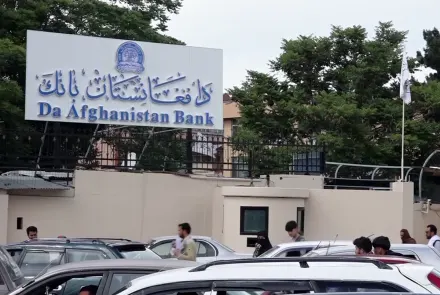The Islamic Emirate’s spokesman, Zabihullah Mujahid, in reaction to the US Special Inspector General for Afghanistan Reconstruction’s report, said that enough Afghani currency exists in the Central Bank.
SIGAR in its recent report said that it found that UN entities and UN-partnered PIOs and NGOs receiving cash via UN’s cash shipments use either US dollars or afghanis to fund operations.
“When these groups require afghanis, they solicit bids from private banks to convert shipped US currency,” it said. “However, SIGAR found many private banks don’t maintain enough afghanis to exchange for large amounts of U.S. dollars.”
Mujahid argued that the Central Bank or “Da Afghanistan Bank” is operating based on national interest.
“The banking services are based on the national interest of the people of Afghanistan. The monetary policy also caused the value of the Afghani currency to remain stable,” he said.
Economists meanwhile stressed that international assistance should be invested in areas where job opportunities are created for citizens.
“The good news is that the government should pay attention to the areas to provide work opportunities for the citizens,” said Mohammad Nabi Afghan, an economist.
The Islamic Emirate responded to SIGAR’s report claiming that “the Taliban indirectly benefit from U.S.-funded education assistance” by stating that the organization’s findings are wildly inaccurate.
The Deputy Spokesman of the Islamic Emirate, Bilal Karimi, said that the current government regulates all issues based on the interests of the country.
“This administration’s statements about the issues of Afghanistan are far from truth. The Islamic Emirate regulates all the issues and affairs and everything that is going on in Afghanistan according to the principles and interests of its country,” Karimi noted.
This comes as the Special Inspector General for Afghanistan (SIGAR), said in its recent report that the Islamic Emirate indirectly benefits from US-funded education assistance.
“The Taliban benefit from U.S. education funding through the establishment of fraudulent NGOs to receive donor assistance, and by infiltrating and extorting existing Afghan NGOs delivering educational assistance,” the report reads.
According to SIGAR’s report, “Even boys’ secondary school attendance decreased by more than 10 percent in eight provinces. In addition, a chancellor of one private university told SIGAR that immediately following August 2021, the university lost 50 percent of its enrolled students and that all woman’s educational programs at the university.”
The Special Inspector General for Afghanistan (SIGAR) said the current Afghan government policies have also “limited students’ access to education because restrictions on women teachers have caused staffing shortages.”
Meanwhile, some economists gave various views regarding SIGAR’s report.
“I think that, from the start, America and its allies have known that the Islamic Emirate in Afghanistan has access to the thirty to forty million dollars that are sent there every week in addition to other forms of aid,” said Seiyar Qureshi, an economist.
Previously, the UN Security Council said in a report that 56 humanitarian aid programs in Afghanistan have been stopped due to the intervention of the Islamic Emirate.
However, the Islamic Emirate has said that they only provide security for relief organizations and do not interfere in the internal affairs of the organizations.—Tolonews










